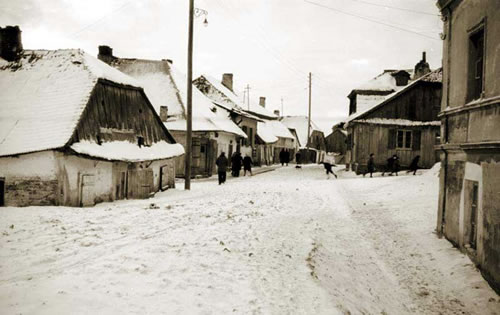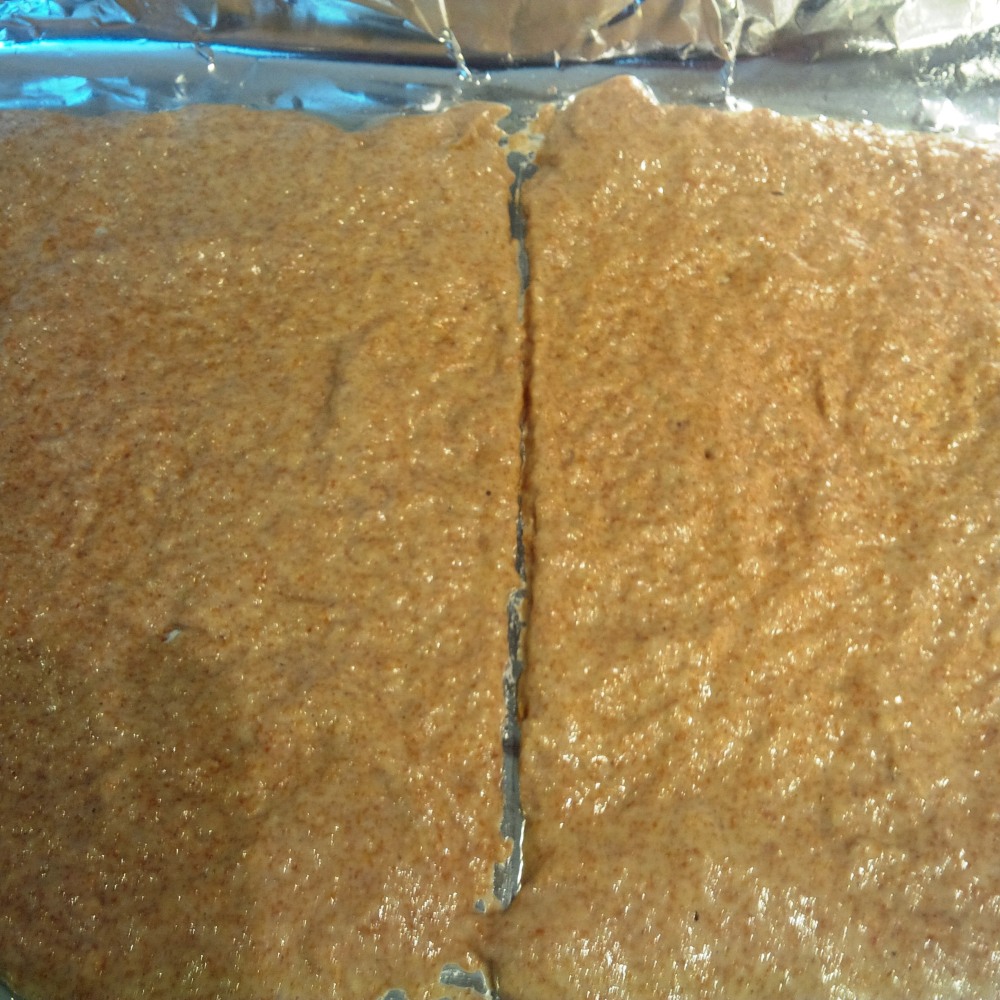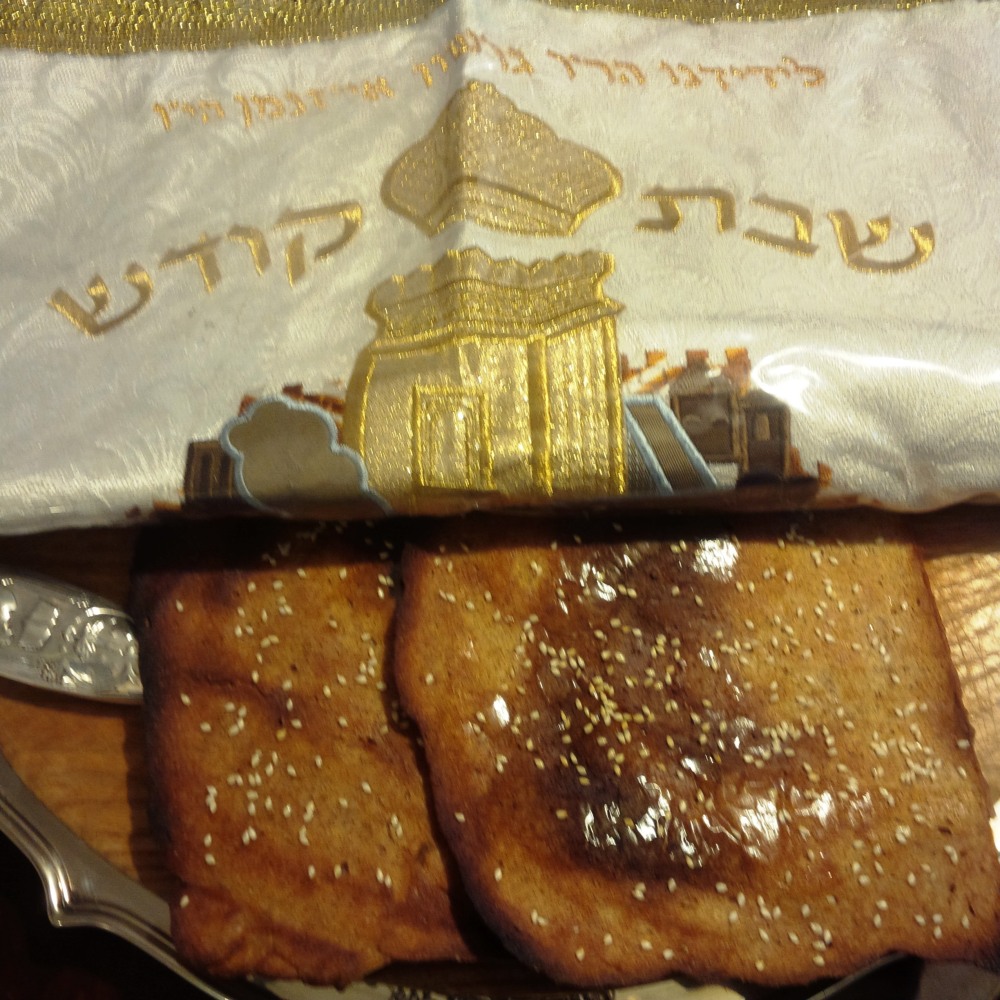We do not cook on Shabbos. Food must be ready before sundown on Friday, and nothing could be cooked or even reheated until after sundown on Saturday. Yet the tradition demands hot food to be served both on Friday night and on Saturday afternoon. Friday night is relatively easy as you finish cooking or heating things up right before lighting Shabbos candles, and hot dinner is ready to be served. But how do you keep it hot for Saturday afternoon?

In a “kleine shteitl” (little Eastern European villages within the Pale of Settlement), poor families could not afford their own brick ovens – and most of them were extremely poor. There was one huge communal oven where most women would put their clay pots with chaulent (traditional Shabbos meat stew) on Friday afternoon, to be picked up and carried home after Shabbos morning services. As most clay pots looked the same, to distinguish their own delicious chaulent from their neighbors’ (“What does SHE know from cooking?”), they would mix a bit of flour with water into a thin flat cake, seal the pot and scribble a letter or a symbol on it. Since those flat cakes, imbued with the flavors of the stew, were undisputed kids’ favorites, mothers also made some extras and stuck them to the walls of the oven. Those were called popalik. Children used to fight for them, so smart mothers made sure that each one enjoyed his or her own popalik, to dip into their own bowls of hot chaulent.

Once upon the time, a widower with one son married a widow who had eight children. For their first Shabbos together, she went out of her way to prepare the best meal their meager resources allowed. Anxiously rushing around, she forgot to count her new stepson and automatically made only eight popaliks, as she has always done. And as they have always done, her children grabbed a popalik each, as soon as the meal started.
“Oy-vavoy Moishele! – exclaimed the stepmother,- I forgot all about you! What should we do?”
“No problem,- said Moishele,- I am just a poor orphan, I don’t need much. If everyone of your children just spares half a popalik, it’ll be more than enough for me.”
Obviously, the poor orphan Moishele knew his fractions!
Even though I grew up in a large metropolitan city, my grandmother had been a product of a shteitl upbringing. And even though we never lacked for an extra piece of meat in a chaulent or the best flour for delicious challahs, she often made popaliks as a special Shabbos treat for kids. To honor her memory, I made them as a treat for my husband.

Basically, it is just flatbread made of flour and water with a pinch of salt and a pinch of sugar. I used spelt flour. For our purposes, I consider spelt gluten free, but if you are allergic or have a celiac disease, please consult your doctor. Gluten free flour will be just fine. I also used a splash of agave instead of sugar and a bit of baking powder. A sprinkle of sesame seeds is added later.

I make this dough pretty thin so that it can be poured, rather than shaped, on a well oiled baking sheet. As I am a stickler about researching everything I publish, while it was baking on one side, I googled popalik. I always thought that it came from Russian palit’ (burn), as they do get well done on one side. Imagine my surprise when I found a Marathi Indian word popali which means “A tiny cake (of fine flour and milk) baked on live coals (esp. for children)” (http://www.marathidictionary.org/meaning.php?id=37587&lang=Marathi). Substitute water for milk because of meat in the chaulent, and you have our popalik! How is that for cross-cultural influences?
Tradition! While you are enjoying the inimitable Topol as Tevye the Milkman, don’t forget to flip your popaliks, sprinkle them with sesame seeds, and send them to the oven for another 10 -15 minutes.

As I made the required size and volume, we are actually going to have these beauties instead of challahs tonight. Schmeared with my Herbed and Spiced NOT Butter (to see the recipe, please click here), it will definitely be a treat! Good Shabbos!
INGREDIENTS
- 2 cups spelt flour
- 1 cup water
- 1/4 cup agave
- 1 teaspoon salt
- 1/2 teaspoon baking powder
- Sesame seeds to sprinkle
PROCEDURE
- Preheat oven to 450 F.
- Whisk dry ingredients, add water and agave, whisk until smooth. Put aside.
- Oil shallow baking pan, put into preheated oven until hot, about 5 minutes.
- Poor batter into heated pan, flatten, spread, divide into desired size portions.
- Bake for 10 minutes, remove and turn over. Puncture with fork, sprinkle sesame seeds, bake for 10 – 15 minutes until browned.
Enjoy!

What a lovely tradition, no matter where it originated!
LikeLiked by 2 people
Thank you so much, dear Dorothy!
LikeLiked by 2 people
Loved everything about this post.
LikeLiked by 2 people
Thank you so much, dear Bernadette.
LikeLiked by 1 person
Thank you 🙏🙏
LikeLiked by 1 person
Thank you for stopping by, dear friend.
LikeLiked by 1 person
“Obviously, the poor orphan Moishele knew his fractions!”
Opa!!
Oops: I mean… Mamash!! 🙂
This is such a heart-warming and stomach-rumbling story, Dolly, thank you for sharing it. And I have now learned of a new treat!
🙂
Shabbat Shalom,
-Shira
LikeLiked by 1 person
Thank you so much, dear Shira!
I knew this story from very early childhood, and popaliks were part of my childhood, too.
I know what Opa! means – we had Greek neighbors.
Much love,
D
LikeLiked by 1 person
🙂
I meant to say: Oops, wrong language! 🙂
LikeLiked by 1 person
I know, just pulling your tail! You should be used to it by now – I am from Odessa, the city where humor was born.
Much love,
D
LikeLiked by 1 person
LOL!!
Of course!
🙂
LOL!
LikeLiked by 1 person
😻
LikeLiked by 1 person
Hi Dolly!! Yummy as always! What a cool thing to find matching traditions, across cultures!
What is shteitl?
❤ Melinda
LikeLiked by 1 person
When Catherine the Great instituted Pale of Settlement (an area designated for the Jews who needed a special permission to reside elsewhere), big cities were not included in it, but only small towns and villages. In Yiddish, small town is called “shteitl,” and a very small town is a “kleine shteitl.”
I am glad you like it, dear purple person!
LikeLiked by 1 person
Thanks! I love learning new words! Does that make me a “wordaphile”? ❤
LikeLiked by 2 people
People who collect words are called verbophiles, while people who love words are called verbovores. Which one are you?
You are very welcome, darling!
LikeLiked by 2 people
I am collecting some new words! 🙏🙏🙏
LikeLiked by 2 people
You re are verbophile, dear friend! 😻
LikeLiked by 2 people
So it seems!
LikeLiked by 1 person
Aha! Umm, more of a verbovore, I think? My Mama is definitely a verbophile.
LikeLiked by 1 person
As long as both you and your Mama are enjoying it!
LikeLiked by 1 person
Yes indeed!
LikeLiked by 1 person
I’m guessing you’re trying to use all the flour before Pesach! שבת שלום וחג שמח! 🙂
LikeLiked by 1 person
LOL You guessed it! Hag Kosher v’Sameach to you too, dear Ronit!
LikeLiked by 1 person
Thank you! 🙂
LikeLiked by 1 person
My pleasure, dear Ronit.
LikeLiked by 1 person
I do like your social history articles, too. In the days when most households didn’t have their own ovens, I believe people used to take their own cooking down to the bakers’ ovens.
LikeLiked by 1 person
Ah, so there is a cross-cultural similarity again. Thank you for adding this piece of information, Derrick.
However, in the small towns and villages in the Pale of Settlement women baked their own bread, as it is considered one of the special good deeds incumbent upon women; thus, there was no need for bakers.
Thank you so much for an interesting comment.
LikeLiked by 1 person
Thanks the educational food piece. Love the tradition
LikeLiked by 1 person
Thank you so much, darling.
LikeLiked by 1 person
Dolly,
Really? I thought the Russian word for burn was жечь… or горит, depending upon the context.
I had a close friend that I lived with who used to put dough around the edges of our crockpot – it was delicious!
Shavua Tov,
David
LikeLiked by 1 person
Shavuah Tov!
“Палить” is a synonym to “жечь,” as in the song “Опалённое Солнце” or the line in Lermontov’s poem Borodino “Москва, спалённая пожаром.”
Have a wonderful week,
D
LikeLiked by 1 person
Wow. I did not know that!
LikeLiked by 1 person
While English technically has more words than Russian, some Russian words have more synonyms, possibly due to more frequent usage, i.e dwellings, villages, and even cities being burned numerous times. It is similar to Eskimo/Inuit languages having more than a hundred synonyms for snow. Linguistic variety develops according to usage; thus English have many words related to water.
LikeLiked by 1 person
So how would use this form of “burned” in a sentence like – “I burned the toast by accident.”? (you can write it in Russian – no need for transliteration)
LikeLiked by 1 person
That depends on the condition of the toast. If you only burned it slightly, it’s “Я случайно подпалил тост,” but if the toast is “toast,” then. “Я случайно спалил тост.”
LikeLiked by 1 person
A very nice tradition, and that child was quite clever!
LikeLiked by 1 person
I am not sure it’s a true story, but I’ve heard it from early childhood.
Thank you for stopping by, dear Mimi!
LikeLike
I’ve heard this lovely story before. ❤ It reminded me of an incident during the short but petrifying stretch I taught Sunday school.
I would often bring cookies to class. As I could never predict the number of children who might attend, the children were instructed only to take one cookie each. That way there would be enough to go around.
On this particular day, we ran short. Evidently, some of the children had taken more than their share. But another youngster quickly step forward, and divided his own cookie w/ the child who would otherwise have gone w/o.
Problem solved as God would have wished.
LikeLiked by 1 person
What a lovely gesture coming from a wonderful child! Thank you for sharing it with me, dear Anna.
I am just curious: why was it a petrifying experience?
LikeLiked by 1 person
I wanted to be the best teacher possible, and so often fell short. Facing the children — much as I loved them and wanted to be there — was a real challenge. I would feverishly make posters ahead of time, and lesson plans to which we rarely adhered (LOL). I can only hope I did no lasting damage.
LikeLiked by 2 people
From my many years of experience teaching future teachers and supervising their field hours and internships I can assure you, dear Anna, that even the most inept teachers (and I don’t think you were all that inept!) who love children leave a positive impact. However, the most technically adept teachers who view education as a job, rather than a labor of love, do cause damage.
LikeLiked by 2 people
They are definitely delicious, Dolly! Last time my mother had made (after your cookbook as i remember) i missed Agave syrup here. I hope you had a wonderful Shabbos. Have you heard about our Germans (not the Jewish citizens, the others) want to liberate not only the Roman-Catholics. They also want to “liberate” the Jewish tradition of not working on Shabbos. Michael.
LikeLiked by 2 people
Your mother uses my cookbook? Wow! I am honored, Michael!
Shabbos is not a tradition, it’s a law. It is such an impolrtant law that even now, when we don’t have a Temple to bring sacrifices, there is still a mandatory sacrifice for involuntary violation of Shabbos, calculated in terms of either days of fasting or weight of silver according to current price. We say that it’s not Jews who preserved Shabbos, but Shabbos that preserved the Jews. “Liberating” Jews from Shabbos means liberating Germany from Jews. Someone, may his name be erased from history forever, has already tried that!
LikeLiked by 3 people
I fully agree, Dolly! Think one want to liberating too much. Yes, most dishes i am “ordering” by my mom. Lol I only have to translate something. 😉 Lets hope our “special one” in Germany will end this discussions. Best wishes, Michael
LikeLiked by 1 person
I am so pleased that you and your mother are using my recipes, Michael!
Best wishes for a Happy Passover and a good year!
LikeLiked by 1 person
Its wonderful to know where we can find recipes with best reputation, Dolly! Its also the best way bringing my mom far away from here traditional cooking and baking with too much fat and sugar. 😉 Have also a Happy Passover and a beautiful year! Michael
LikeLiked by 1 person
You made my day, Michael! I am so grateful to know that people out there appreciate my humble contributions to their cooking!
Have a wonderful day, dear friend!
LikeLiked by 1 person
Thank you, Dolly! A great pleasure and also honor. Have also a great day. Here we are ranting about the new lockdown. 😉 Michael
LikeLiked by 1 person
I would imagine! I have lived in self-imposed lockdown since the pandemic has started, and I can’t wait for things to ease up.
LikeLiked by 1 person
Lets hope so, Dolly! Our predicted new lockdown was cancelled at dinner time today. Our churches were afraid that nobody would come to church services at all. Lol Sorry, but our churches here only seem to be service companies for the state. Have a nice day! Michael
LikeLiked by 1 person
I am glad to hear about your cancelled lockdown.
Be well and stay safe, Michael!
LikeLike
Thank you very much, Dolly! You as well! today i have read we for sure will not loose the virus before 2025. Seems we have to stock up more masks, but it will force the modernisation of our community, with digitization. Have a nice day! Michael
LikeLiked by 1 person
You, too, have a wonderful day, Michael!
LikeLiked by 1 person
Thank you, Dolly! :-))
LikeLiked by 1 person
My pleasure, Michael.
LikeLiked by 1 person
:-))
LikeLiked by 1 person
Reblogged this on By the Mighty Mumford and commented:
YOWZA-!
LikeLike